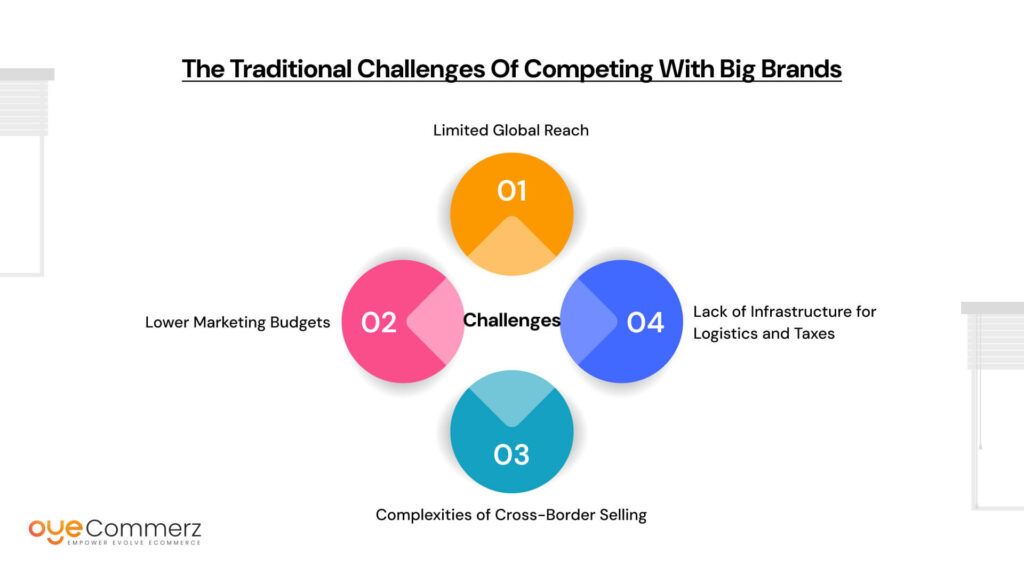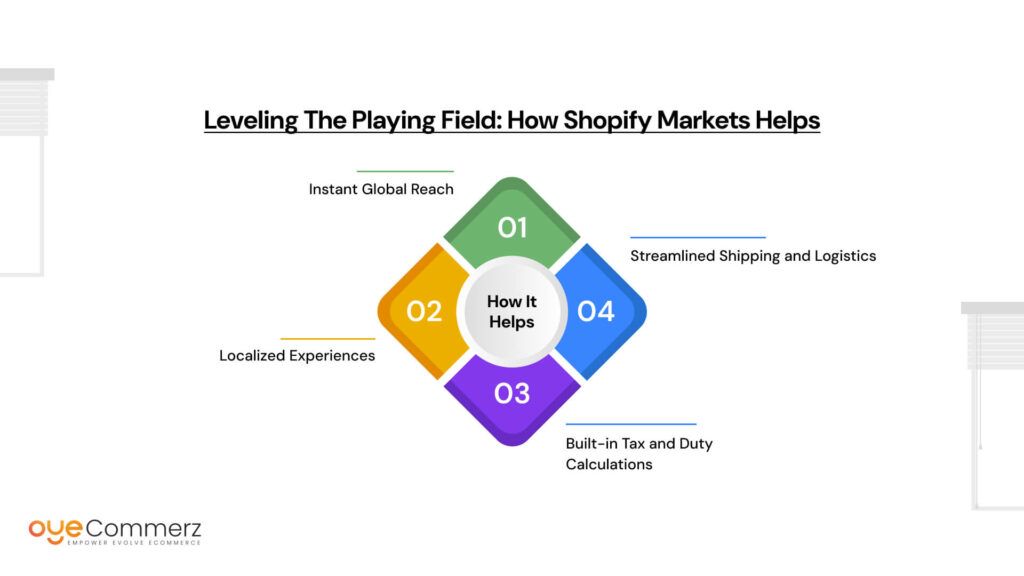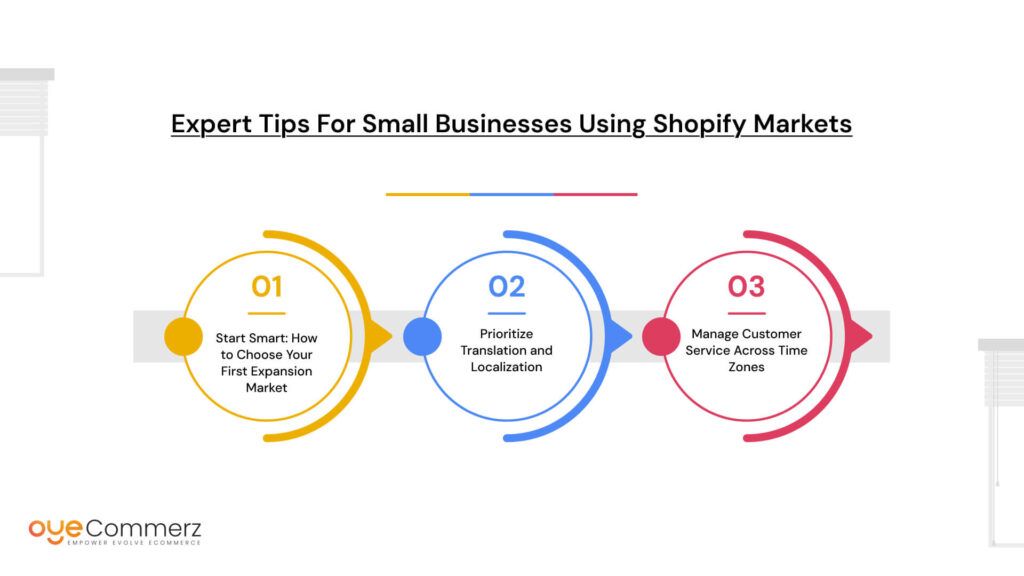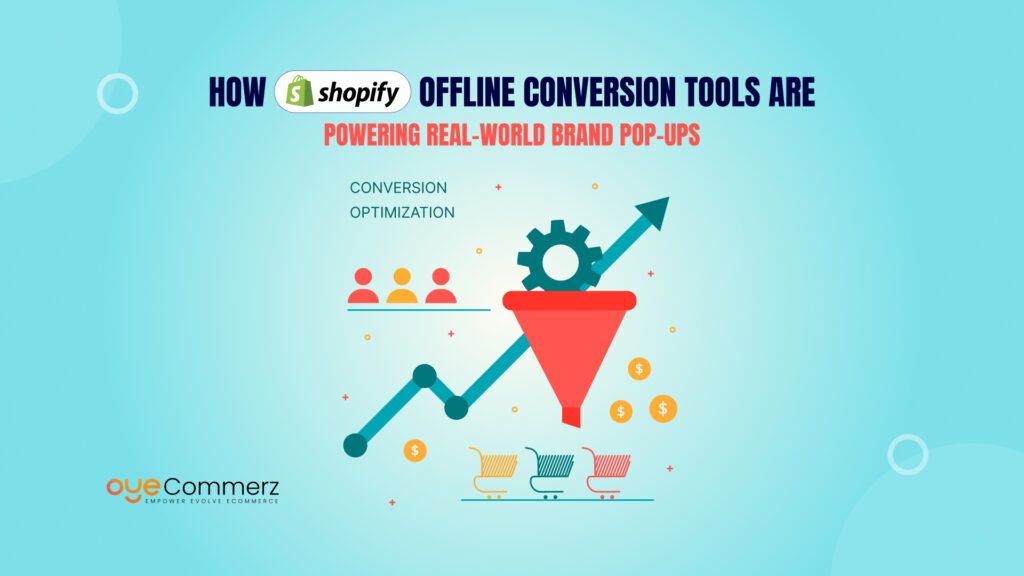Can small businesses really compete with global giants like Amazon or Zara? In today’s eCommerce world, the odds seem stacked against smaller brands limited budgets, complex logistics, and the challenge of reaching international customers.
But Shopify Markets is changing the game. It gives small businesses powerful tools to sell globally like local currency support, language translation, and automatic tax handling without the need for a massive team or budget.
In this blog, we’ll explore how Shopify Markets helps small businesses compete with big brands and grow beyond borders.
Table of Contents
ToggleUnderstanding Shopify Markets
What is Shopify Markets?
Shopify Markets is a built-in tool that helps Shopify merchants sell internationally with ease. It centralizes global selling so you can manage multiple markets from a single store.
Key Features:
- Sell in multiple countries from one dashboard
- Localized shopping experiences with currency and language adjustments
- Use country specific domains to boost SEO and trust
- Automatic tax and VAT calculations
- Manage shipping, duties, and pricing per market
Why It Matters for Small Businesses:
Without needing separate stores or complex integrations, small businesses can now reach global audiences with a localized and professional storefront just like the big brands, but at a fraction of the cost and effort.
The Traditional Challenges of Competing with Big Brands

In the world of eCommerce, large brands have a significant head start. They operate at scale, have deep pockets, and leverage global infrastructure to reach customers anywhere. For small businesses, these advantages translate into real-world challenges:
Limited Global Reach
Expanding into international markets can be intimidating. Without the tools or resources to handle different countries, currencies, and regulations, most small businesses focus only on their local market missing out on massive growth opportunities abroad.
Lower Marketing Budgets
Big brands invest millions in advertising, influencer partnerships, and customer acquisition. In contrast, small businesses often work with limited budgets, making it difficult to compete for visibility on platforms like Google, Instagram, and TikTok.
Complexities of Cross-Border Selling
Selling internationally involves more than just shipping products. It requires adapting to new customer expectations, translating content, converting currencies, and offering local payment methods all of which can be overwhelming without the right technology.
Lack of Infrastructure for Logistics and Taxes
International shipping, customs duties, and tax compliance (like VAT or GST) are complicated and vary by country. Big companies have dedicated departments for this, but small businesses often struggle to manage it all risking delays, errors, and customer dissatisfaction.
These barriers have traditionally made global selling out of reach for smaller brands but that’s exactly where Shopify Markets comes in to level the field.
Leveling the Playing Field: How Shopify Markets Helps
Shopify Markets is designed to provide small businesses with the tools and resources they need to expand globally without requiring the large investments typically associated with international growth. This feature empowers small businesses to compete with global brands, offering the same capabilities but at a fraction of the cost. Let’s dive into how Shopify Markets helps small businesses operate like global enterprises:

a. Instant Global Reach
One of the most significant advantages of Shopify Markets is the ability to reach customers in multiple countries, all from a single store. In the past, global expansion required multiple websites, complex systems, and a lot of overhead. Shopify Markets eliminates the need for this, making it easy for small businesses to scale internationally.
- Single Dashboard for Managing All International Markets:
Shopify Markets allows businesses to manage all their global sales from one centralized dashboard. Whether you’re selling in the U.S., Europe, or Asia, you can monitor and control your international sales and performance without switching between different accounts or platforms. - Expand into New Regions with Minimal Setup:
With just a few clicks, businesses can enable international selling in new regions. Shopify makes it simple to add new countries to your store, adjusting for local currencies, languages, and other preferences as needed. There’s no need to reinvent the wheel or deal with complicated tech setups. - Reach New Audiences Across Continents:
Small businesses can now expand their customer base far beyond their home country. Shopify Markets breaks down geographical barriers, allowing brands to tap into audiences across continents without the need for large teams or complex tech. Whether you’re looking to enter the European, Asian, or Latin American markets, Shopify Markets provides the infrastructure needed to succeed globally.
b. Localized Experiences
Localization is crucial when it comes to international selling. If you want to connect with customers in different regions, you need to provide a shopping experience that feels personal and relevant to their needs. Shopify Markets makes localization easier and more efficient, ensuring customers from different countries feel comfortable and confident when shopping on your site.
- Display Prices in Local Currencies:
Shopify Markets automatically adjusts the prices on your site based on the customer’s location, displaying the appropriate currency for their country. This means customers from Canada will see prices in Canadian dollars, while those from the UK will see British pounds, fostering a more authentic shopping experience. - Offer Local Languages:
Language is a critical part of building trust with international customers. Shopify Markets allows you to translate your website into multiple languages. This helps ensure that customers from different regions can navigate your site and make purchases in a language they understand. From product descriptions to checkout pages, everything can be customized to provide a seamless experience. - Use Country-Specific Domains:
Shopify Markets lets you set up country-specific domains (e.g., .uk for the UK, .ca for Canada) to improve search engine visibility and customer trust. Having a localized domain boosts your SEO efforts, helping your business rank higher in regional search results. This also helps build trust with customers, as they are more likely to buy from a store with a local domain that feels familiar and secure.
c. Built-in Tax and Duty Calculations
International tax laws and duties can be complex and overwhelming, especially for small businesses. Shopify Markets automates these processes, making it easier for small businesses to comply with global tax regulations and offer transparent pricing to their customers.
- Automatic Tax and Duty Calculations:
Shopify Markets automatically calculates the appropriate taxes and duties based on the customer’s location, ensuring that businesses comply with local tax laws without the need for manual intervention. This helps businesses avoid potential legal issues and costly errors. - Transparent Pricing at Checkout:
One of the key challenges of international shopping is hidden fees and unexpected charges. Shopify Markets solves this by providing transparent pricing at checkout. Customers will see the full price, including any applicable taxes and duties, before they complete their purchase. This transparency helps build trust and reduces cart abandonment. - Compliance with Global Tax Regulations:
Shopify Markets ensures your business is compliant with tax regulations like VAT in Europe, GST in Australia, and other local tax laws around the world. This means you don’t have to worry about keeping track of constantly changing tax laws in every region you sell to, as Shopify handles this automatically.
d. Streamlined Shipping and Logistics
Cross-border shipping and logistics are often one of the most significant barriers to international selling. Shopify Markets takes the complexity out of shipping, helping small businesses provide a smooth and reliable experience for customers, no matter where they are.
- Integration with Global Shipping and Fulfillment Providers:
Shopify integrates with a wide range of global shipping and fulfillment partners, enabling businesses to offer competitive and reliable shipping options to international customers. From well-known carriers like DHL and FedEx to local providers, Shopify makes it easy to find the right solution for your business. - Real-Time Shipping Rates and Delivery Estimates:
Shopify Markets shows real-time shipping rates and delivery estimates during checkout, so customers know exactly when to expect their orders and how much it will cost. This reduces surprises and ensures customers have all the information they need before making a purchase. - Managing Local Delivery Preferences and Customs Documentation:
Shipping internationally isn’t just about delivery it’s also about ensuring compliance with customs regulations and managing local delivery preferences. Shopify Markets simplifies this by automating much of the customs documentation process and allowing you to set specific delivery preferences for different regions. This ensures that your products reach customers quickly and without any issues at customs.
By removing traditional barriers like international logistics, tax compliance, and complex localization, Shopify Markets gives small businesses the tools they need to operate on a global scale. Whether you’re just starting to explore international markets or looking to expand your existing operations, Shopify Markets levels the playing field, enabling small businesses to compete with big brands without the heavy investment.
Cost-Effective International Marketing Tools
Marketing to a global audience doesn’t have to mean burning through your budget. Shopify Markets offers tools and integrations that help small businesses market smartly without overspending.
Integrations with Google, Facebook, Instagram, and TikTok
Shopify seamlessly connects with major advertising platforms, allowing you to create and manage global ad campaigns directly from your dashboard.
- Reach international audiences through targeted ads
- Sync your product catalog to platforms like Facebook and TikTok for seamless shopping experiences
- Use geo-targeted marketing to focus on the most relevant regions for your brand
Multilingual SEO Tools
Ranking well on international search engines requires more than just translation; it requires localization.
- Shopify Markets helps you optimize product pages, meta tags, and URLs in different languages
- Use country-specific domains and hreflang tags to boost visibility in local search results
- Tailor your content to local keywords and shopping behavior
Easy to Launch Localized Campaigns
Don’t have a global marketing team? No problem.
- Launch localized promotions and campaigns from one centralized place
- Customize pricing, discounts, and shipping rules per market
- Test and adjust strategies quickly without costly overhead
With these built-in marketing capabilities, Shopify Markets allows small businesses to punch above their weight and reach the right customers, in the right language, with the right message anywhere in the world.
Expert Tips for Small Businesses Using Shopify Markets

Going global with Shopify Markets can be great but like any tool, success comes down to how you use it. Here are some expert tips to help small businesses get the most from their international expansion.
1. Start Smart: How to Choose Your First Expansion Market
Don’t try to sell everywhere at once. Begin with one or two markets that show the most potential.
- Use analytics to identify where existing traffic or interest is coming from
- Consider shipping costs, demand for your product, and language barriers
- Look for regions with similar buying behavior or cultural familiarity to your home market
2. Prioritize Translation and Localization
A translated site is not the same as a localized one. Go beyond language to truly connect with customers.
- Translate product descriptions, checkout pages, and marketing content
- Adapt tone, imagery, and even product selection to suit cultural preferences
- Use Shopify Markets’ language and currency tools to build trust and improve conversions
3. Manage Customer Service Across Time Zones
Global customers mean 24/7 expectations. Plan for responsive and respectful communication.
- Set clear expectations for response times on your website
- Use tools like auto-responders or AI chatbots to handle basic inquiries
- Consider hiring freelancers or part-time reps in key markets to cover different time zones.
These small steps can make a big difference in the success of your international efforts turning one successful market into many.
Common Challenges to Avoid
While Shopify Markets simplifies global selling, there are still a few pitfalls that small businesses should watch out for. Avoiding these mistakes can save you time, money, and customer trust.
1. Not Testing Currency Conversion and Checkout
Just enabling multiple currencies isn’t enough to make sure the entire checkout process works smoothly.
- Regularly test currency display and payment gateways for different markets
- Check for unexpected fees, rounding issues, or payment errors
- Ensure a consistent experience from product page to confirmation
2. Forgetting About International Return Policies
Returns are a key part of the buying decision especially for international customers.
- Be clear about return windows, costs, and shipping responsibilities
- Offer localized return instructions where possible
- Partner with return logistics providers to simplify the process
3. Overcomplicating Logistics Without Local Partnerships
Trying to manage all shipping in-house can lead to delays and high costs.
- Work with local fulfillment centers or 3PLs (third-party logistics) in target regions
- Use Shopify’s integrations for real-time shipping rates and tracking
- Focus on reliability and speed, not just cost
By avoiding these common challenges, small businesses can offer a smoother, more professional international shopping experience building trust and driving repeat sales.
Ready to Go Global?
Partner with Oyecommerz to set up Shopify Markets and start selling worldwide today. We specialize in helping small businesses scale seamlessly and reach new international markets.
Get your free consultation now and take the first step toward expanding your business globally with confidence!
Contact to Migrate your Site to Shopify Now
Conclusion
Shopify Markets gives small businesses the tools to compete globally, from instant international reach and localized experiences to built-in tax management and streamlined shipping. With these features, you don’t need a massive budget or complex infrastructure to sell worldwide.
Take the leap and explore global selling with confidence Shopify Markets levels the playing field and allows you to compete smartly, not just spend big. It’s all about working smarter, reaching new customers, and scaling your business with the right tools at your fingertips.
Frequently Asked Questions
Small businesses can compete with larger brands by leveraging unique advantages such as flexibility, personalized customer service, niche offerings, and the ability to adapt quickly to market changes. Utilizing cost-effective tools like Shopify can help small businesses expand their reach, streamline operations, and compete on a global scale.
Shopify is an easy-to-use eCommerce platform that allows small businesses to set up, manage, and scale their online stores. It provides everything a small business needs, including customizable themes, secure payment gateways, inventory management, and marketing tools. Shopify also integrates with other platforms for seamless sales, shipping, and customer management.
Yes, many big brands use Shopify, including well-known companies like Gymshark, Heinz, Allbirds, and Kylie Cosmetics. Shopify’s scalability, robust features, and customization options make it suitable for businesses of all sizes, from small startups to large enterprises.
The main advantage of Shopify is its ease of use combined with powerful features that enable businesses to set up, manage, and scale online stores quickly. It offers seamless integrations, global selling capabilities, customizable designs, and an all-in-one solution for eCommerce, making it a popular choice for both small businesses and large enterprises.



